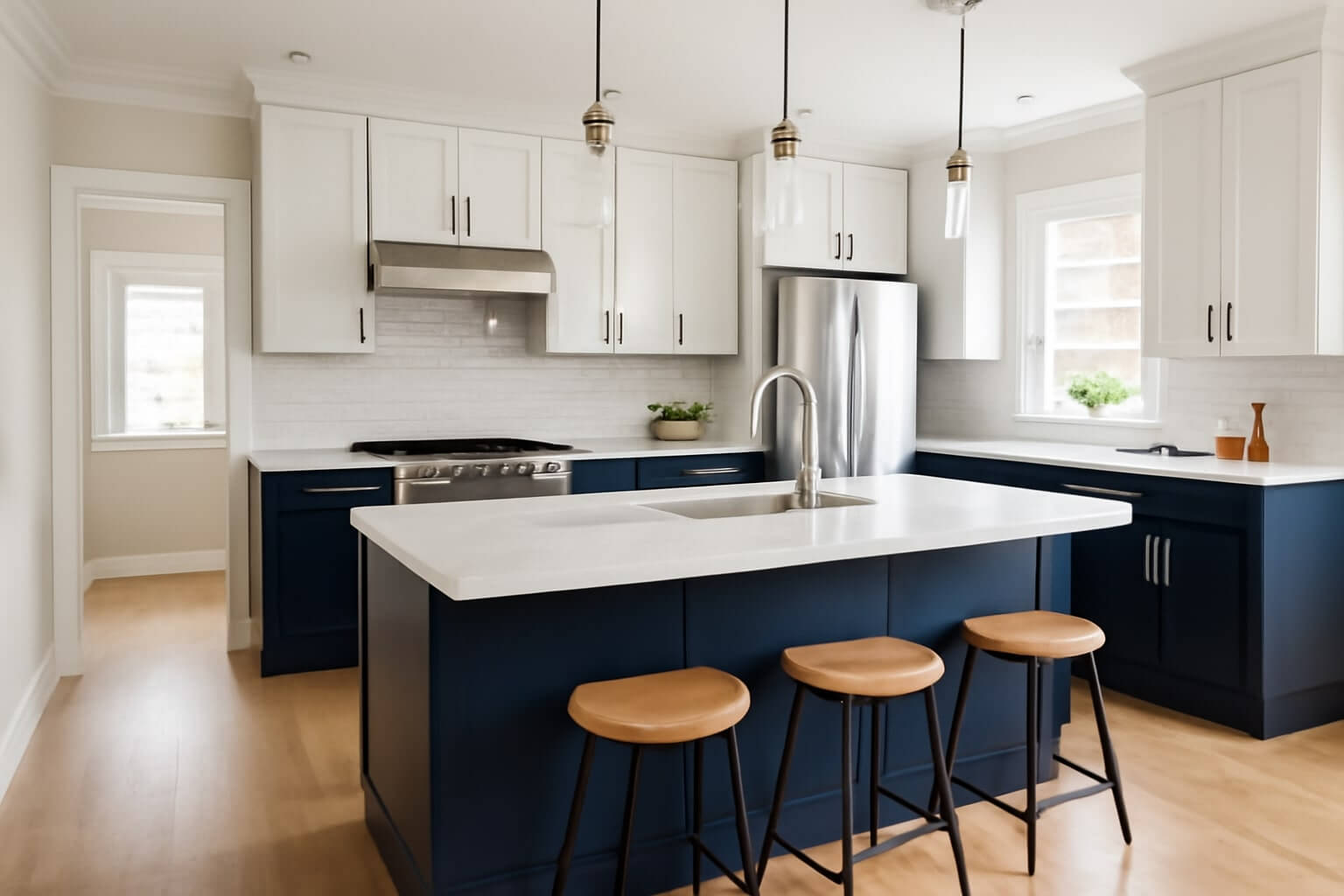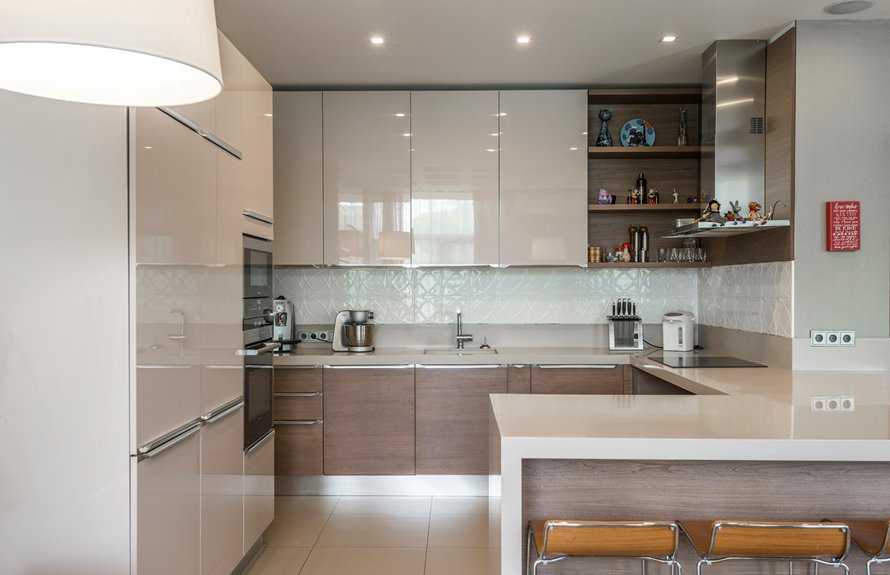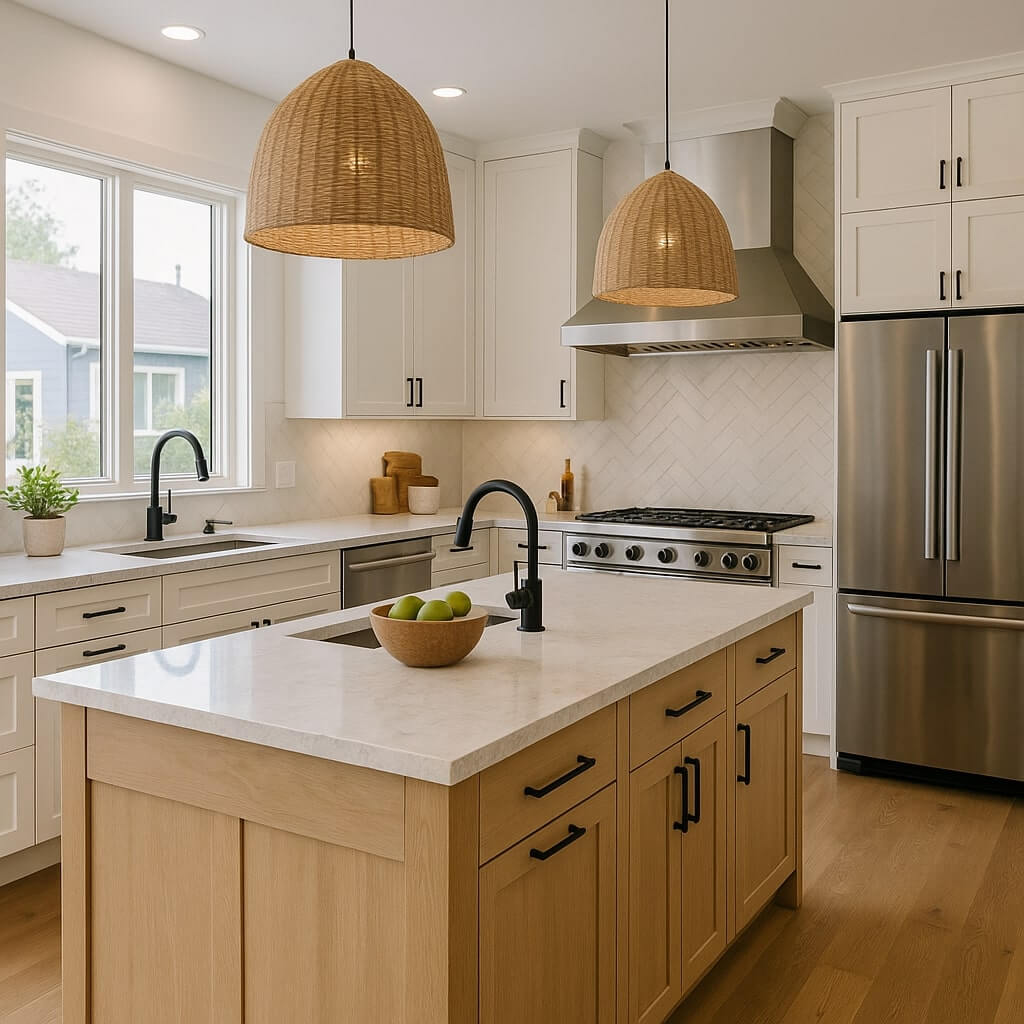When you’re planning a kitchen remodel in Chicago, it’s essential to contemplate several key factors that can impact your budget. The size of your kitchen plays a significant role, as does the quality of materials you choose. Labor costs can vary based on the complexity of your design, and local regulations might add unexpected expenses. Understanding these elements can help you navigate your project effectively. So, what else do you need to know to stay on track?
Key Takeaways
- Kitchen size significantly impacts costs, with larger spaces requiring more materials and labor for cabinetry, countertops, and flooring.
- The quality of materials affects both durability and aesthetic appeal, influencing long-term cost efficiency and maintenance needs.
- Labor costs vary based on design complexity and local wage rates, with skilled trades like electricians commanding higher prices.
- Familiarity with permits and local regulations is crucial, as compliance can affect project timelines and additional expenses.
- Understanding neighborhood trends and high-demand features helps tailor designs that can enhance property value and potential return on investment.
Size of the Kitchen
When planning a kitchen remodel in Chicago, the size of your kitchen plays a crucial role in determining costs. The kitchen dimensions directly influence how much material you’ll need and the complexity of the layout optimization.
A larger kitchen typically requires more cabinetry, countertops, and flooring, which can increase expenses. However, optimizing your layout can maximize functionality without necessarily expanding the space.
Consider how you use your kitchen; an efficient design can enhance workflow, making even a small area feel larger. By carefully planning your kitchen dimensions and layout, you can create a beautiful space while keeping costs manageable.
Quality of Materials
When you’re planning a kitchen remodel, the quality of materials you choose plays an essential role in the overall outcome.
Durable materials not only enhance longevity but also contribute to the aesthetic appeal and style of your kitchen.
Balancing cost with value is important, as investing in higher-quality materials can provide significant returns in both functionality and visual impact.
Material Durability and Longevity
While you may be tempted to prioritize aesthetics in your kitchen remodel, the durability and longevity of materials should be at the forefront of your decision-making process.
When it comes to material selection, choose options that can withstand daily wear and tear. For instance, quartz countertops and hardwood cabinetry offer excellent durability.
Don’t forget maintenance considerations, either; some materials require more upkeep than others. Investing in high-quality materials may cost more upfront, but their longevity will save you money on repairs and replacements in the long run.
Make informed choices to create a beautiful yet resilient kitchen space.
Aesthetic Appeal and Style
Although durability is essential, the aesthetic appeal and style of your kitchen materials can greatly enhance the overall ambiance of the space.
Choosing the right color schemes is key; they can either brighten or soften the kitchen’s atmosphere. Modern trends favor bold colors and textures, like matte finishes and rich wood tones, which create a striking look.
Incorporating stylish backsplashes or unique countertops can also add character. Don’t overlook the harmony between materials; a cohesive style will elevate your kitchen’s design.
Ultimately, the right aesthetic choices will transform your kitchen into a welcoming, functional area that reflects your personal taste.
Cost vs. Value Ratio
Understanding the cost vs. value ratio of materials is essential for making informed decisions during your kitchen remodel. High-quality materials might seem pricey, but they often offer better cost efficiency and longevity, leading to a higher investment return.
For instance, opting for durable countertops can save you money on replacements down the line. Conversely, cheaper options may initially fit your budget but could lead to higher long-term costs due to frequent repairs or replacements.
Labor Costs
When planning your kitchen remodel in Chicago, understanding labor costs is essential.
Skilled labor rates can vary considerably based on project complexity and local wage variations, so it’s important to budget accordingly.
Skilled Labor Rates
Skilled labor rates in Chicago can markedly impact your kitchen remodel budget, often varying based on the type of work required and the experience of the professionals you hire.
When you’re planning your project, it’s essential to understand that skilled labor, like electricians and carpenters, typically commands higher wages due to their expertise.
Don’t hesitate to engage in wage negotiation; many contractors are open to discussing rates, especially if you can offer a steady stream of work.
Project Complexity Impact
The complexity of your kitchen remodel greatly influences labor costs, as more intricate designs and installations require higher levels of skill and time.
A detailed project can stretch your remodel timeline and budget. Consider these factors:
- Custom cabinetry: Building unique cabinets demands skilled carpentry, adding to labor costs.
- Complex layouts: Open-concept designs or multiple work zones require meticulous planning and execution.
- Advanced technology: Incorporating smart appliances or specialized lighting can increase installation time and expertise.
Staying updated with design trends can also help you balance complexity and cost effectively, ensuring a beautiful kitchen without breaking the bank.
Local Wage Variations
While planning your kitchen remodel in Chicago, understanding local wage variations can greatly impact your overall labor costs.
Wage disparities across neighborhoods can lead to significant differences in contractor fees. For example, high-demand areas may command premium rates due to regional influences like cost of living and competition for skilled labor.
You’ll want to research average wages in your specific area to budget effectively. Additionally, hiring local tradespeople could save you money, as they’re often more familiar with regional standards and codes.
Design Complexity
When you’re planning a kitchen remodel, understanding design complexity is essential to budgeting effectively. The more intricate your design, the higher the costs will likely be.
Consider these factors:
- Design Trends: Incorporating popular trends, like open-concept layouts or smart appliances, can elevate your kitchen but may add to expenses.
- Layout Efficiency: A well-planned layout maximizes space and functionality, requiring careful design consideration.
- Material Choices: Custom cabinetry or high-end finishes can greatly impact your budget, so weigh your options wisely.
Keeping these elements in mind helps you achieve a beautiful kitchen without breaking the bank.
Permits and Regulations
Maneuvering permits and regulations is essential for a successful kitchen remodel in Chicago, as failing to comply can lead to delays and unexpected costs.
You’ll need to familiarize yourself with various permit types, such as building, electrical, and plumbing permits, depending on your remodel’s scope. Each type guarantees that your project adheres to local codes and safety standards.
To streamline the process, keep all documentation organized and consult local authorities for specific requirements.
Prioritizing regulation compliance not only helps avoid fines but also assures your remodel meets safety standards, ultimately protecting your investment and enhancing your kitchen’s functionality.
Appliances and Fixtures
Choosing the right appliances and fixtures can greatly impact both the functionality and aesthetics of your kitchen remodel in Chicago.
Prioritizing energy efficiency not only saves you money but also enhances your home’s value.
Consider these key factors:
- Appliance Brands: Opt for brands with a solid reputation for reliability and performance.
- Energy Ratings: Look for appliances with high energy ratings to reduce long-term costs and environmental impact.
- Fixtures Design: Choose fixtures that complement your kitchen’s style while providing durability and ease of use.
Invest wisely, and your selections will elevate your kitchen remodel greatly.
Location and Accessibility
While the design and layout of your kitchen are essential, considering the location and accessibility can greatly influence your remodel’s overall success. Neighborhood trends may dictate what features are in demand, impacting your investment’s value. Additionally, zoning restrictions can limit your design choices, affecting the overall cost. Understanding these factors is vital for a successful remodel.
| Factor | Impact on Costs | Considerations |
|---|---|---|
| Neighborhood Trends | High demand features | Research local preferences |
| Zoning Restrictions | Design limitations | Check local regulations |
| Accessibility | Cost of modifications | Plan for ease of movement |
Conclusion
In conclusion, when planning your kitchen remodel in Chicago, it’s essential to take into account these seven factors. The size and quality of materials directly impact your budget, while labor costs can vary based on design complexity. Don’t forget to account for necessary permits and regulations, as well as the appliances and fixtures you choose. Finally, think about your location and accessibility, as these can influence both your design choices and overall expenses. Careful planning will help you stay on track financially.




